
Alphabetical Menu
Chronological Menu
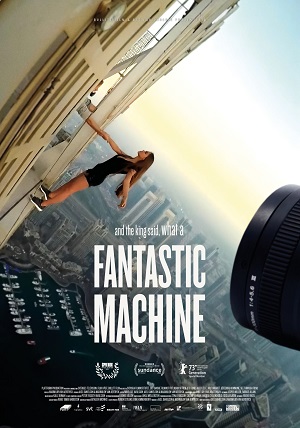
Fantastic Machine is an unfocused, meandering and shallow documentary about the history of photography starting at 1880 when Eadweard Muybridge invented the first moving images. Co-directors Axel Danielson and Maximilien Van Aertryck bombard the audience with images, archival footage and contemporary footage from social media with some voice-over narration. You'll learn how the camera has evolved throughout the years and can be used for different purposes, i.e. propaganda. You'll also learn how modern society has become obsessed with capturing images with cameras which are readily available thanks to the advancement of modern technology. Fantastic Machine's systemic problem, though, is that it's too broad in scope while lacking insight and saying nothing new or surprising. It's a fine reader's digest introduction to the history of cameras and image capturing, but not very profound, thorough nor focused as it jumps from one time period to the next. Perhaps stepping away from the images briefly and interviewing some scholars could've provided much-needed insights and analysis. You probably won't change the way you look at cameras afterward like you would have if this were a much more illuminating documentary. At a running time of 1 hour and 28 minutes, Fantastic Machine opens at IFC Center via Strand Releasing.

The Mission is a provocative, gripping and exhilarating documentary that centers on John Chau, an evangelical Christian missionary who repeatedly tried to convert the Sentinelese, an indigenous tribe, to Christianity. He died in 2018 when they killed him with arrows during his final attempt to convert them. Co-directors Amanda McBaine and Jesse Moss do a great job of telling John Chau's story in a way that's captivating while also illuminating and increasingly complex, fair and balanced. The film combines footage of John, animated sequences and a wide variety of interviews ranging from Adam Goodheart, a historian, to Levi Davis, John's childhood friend, and Dan Everett, an ex-missionary. They humanize John as best as they can without interviews with him, so by the time the film gets to his tragic end, you can understand everything that led up to it. John comes across as a polite, well-behaved and determined young man, but concurrently flawed because of his naivety and fanaticism. In his own mind, he thought he was doing the right thing by trying to convert the Sentinelese to Christianity. However, from their perspective, they viewed him as a threat. It makes sense why the Sentinelese don't want foreigners there because they don't want to risk any diseases spreading there. Bravo to the filmmakers for not judging John and for not villainizing the Sentinelese who remain an enigma throughout the film. Perhaps one day they'll allow someone to document their culture, but until then, The Mission serves as a cautionary tale for anyone who dares to risk their life to visit them, even with good intentions. At a running time of 1 hour and 49 minutes, The Mission opens at Angelika Film Center via National Geographic Documentary Films. 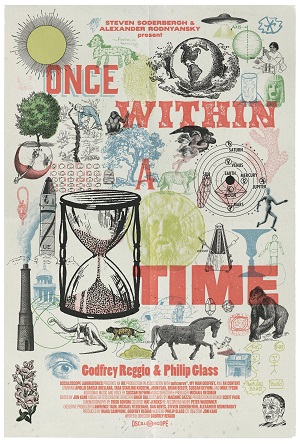
Director Godfrey Reggio is back with a new experimental film with the same kind of social commentary found in his previous films, Koyaanisqatsi, Naqoyqatsi and Powaqqatsi. This time around, he co-directs the film, Once With a Time with Jon Kane. The images are often trippy, surreal and bizarre as well as outrageously funny at times. You'll have to see to believe the way he incorporates Mike Tyson into the film. Although Once Within a Time isn't as moving nor as profound as Reggio's previous experimental cult classics, it's nonetheless mesmerizing and provocative to behold while transcending beyond words. The visual style is reminiscent of Guy Maddin's similarly offbeat and surreal experimental films, so if you're a fan of Maddin, you'll enjoy Once Upon a Time. It might be best if you take a few drinks before watching it or get a little high. Fortunately, before the film becomes tedious and exhausting, it ends after roughly 45 minutes, so it doesn't overstay its welcome like too many films that go on and on these days. Once Within a Time opens at IFC Center via Oscilloscope Laboratories.
Plan C is a mildly engaging and redundant, but moving and focused documentary about Plan C, an organization that helps women to find abortion pills online since its inception in 2014 by co-founders Francine Coeytaux and Elisa Wells. Director Tracy Droz Tragos does a decent job of informing the audience about the purpose of Plan C, their obstacles and its significance, especially during the pandemic and after the fall of Roe v. Wade. Plan C avoids debating the controversial issue of abortion; that's a topic that has been explored over and over in many other documentaries. If you're anti-abortion, this won't be the film for you nor will it convince you to become pro-abortion. Instead, it provides some hope to those who want to have an abortion, but don't have access to abortion pills. The interviews with the co-founders, patients and doctors are occasionally illuminating, but somewhat dull and repetitive. Tighter editing could've reduced the repetitiveness and allowed the film to flow better. Also, at times it feels like merely an infomercial for Plan C without enough variety of perspectives that step back and look at the organization from a more critical viewpoint which would've added some much-needed balance. There are more than 2 sides to a coin, after all: there's the ridges, the corners, etc. At a running time of 1 hour and 39 minutes, Plan C opens at IFC Center via Level 33 Entertainment.
Reality Winner is a vital, illuminating and enraging documentary about how the U.S. government sent Reality Winner, an NSA contractor, to prison after she leaked highly classified NSA documents to journalists at The Intercept. The documents, which have now been made public, prove without a reasonable doubt that Russia meddled in the U.S. election back in 2016. Reality Winner followed in the footsteps of Chelsea Manning, Edward Snowden and other whistleblowers who risked their livelihood for the sake of democracy by exposing truths for the good of the public. Directed by Sonia Kennebeck interviews Reality's mother, sister and friends who provide their own perspectives and insights about the events leading up to Reality's arrest. Edward Snowden also gets interviewed briefly. Prepare for your blood to boil when hearing the audio tapes during Reality's arrest. The way the government treated her like an enemy of the state is terrifying. They also smeared her as someone who hates the USA by taking her comment about Americans' obsession with air conditioners out of context. Do we live in a fascist dystopia where the truth is distorted, what's good is bad and justice is injustice? It certainly seems that we're headed that way if whistleblowers like Reality will continue to be silenced. According to the documentary What is Democracy?, democracy is a place where truth and justice can flourish. Reality Winner is a powerful wake-up call to the harsh truth that we're living in a very dysfunctional democracy. It opens at IFC Center via Codebreaker Films.
Silver Dollar Road is a heartfelt and candid, but only mildly engaging documentary that's limited in scope and ultimately underwhelming. Director Raoul Peck follows the Reels family as they go through legal battles to take back their land that belonged to their ancestors. It has since been sold to developers by once of their family members years ago without their consent. Although this documentary deals with timely, important human rights issues like systemic racism and racist, unfair real estate laws, it barely scratches the surface and doesn't step back to look at the larger picture. Peck should be commended for putting a human face on the issues and for gaining access to members of the Reels family like Mamie Reels Ellison and Kim Renee Duhon, her niece, who provide the film with poignancy and some inspiration because they will never give up their legal fight no matter what the obstacles are. What about other families going through the same struggles? What about other perspectives on the Reel family's struggles? Their issues are complex, but this documentary doesn't have enough insight into those complexities nor does it make you enraged enough, so it's not as powerful, provocative, emotionally resonating or haunting as it should be. It's also shot somewhat blandly, dryly and conventionally without being cinematic enough. At a running time of 1 hour and 40 minutes, Silver Dollar Road opens at Quad Cinema via Amazon Studios. Sandra (Sandra Hüller), an author, lives in an isolated chalet deep in the French Alps with her husband, Samuel (Samuel Theis), and 11-year-old son, Daniel (Milo Machado Graner), who's visually impaired. One day, when Daniel takes the family dog for a walk, he discovers Samuel dead below the chalet's attic window with blood tracks near his body. Sandra hires a lawyer, Vincent Renzi (Swann Arlaud), her good friend, to defend her after she's accused of murdering him by pushing him out of the window. She claims that he committed suicide. The screenplay by writer/director Justine Triet and co-writer Arthur Harari isn't based on a novel, but it's narratively intricate enough to feel like it could be based on one. As the film opens, Sandra sits down for an interview inside the chalet while loud construction noises interrupt the interview. Soon after, Daniel discovers Samuel's corpse outside the chalet. Was Samuel murdered or did he commit suicide? Is Daniel telling the truth when he claims that he heard Sandra and Samuel fighting? Was it physically impossible for him to hear them over the loud construction noise? What was Sandra and Samuel's relationship life before Samuel died? What explains the blood tracks on the snow near his body? Those are among questions posed throughout the trial which contribute to the suspense and intrigue. However, what helps to elevate the film and make it more than just a procedural is that it also serves as a character study of Sandra and Daniel as well as a portrait of a dysfunctional marriage. The plot becomes more compelling and complex as it unfolds, but without being confusing or meandering. In other words, the filmmakers have a great handle on exposition. They know precisely how much information to reveal to the audience, when to reveal it and how to reveal it, so they trust the audience's intelligence. Those aren't easy tasks to accomplish. Anatomy of a Fall's greatest strength, though, is that never forgets to see and treat its characters empathetically as human beings without judging them. It also avoids turning into a melodrama or a dry courtroom drama, so it remains engrossing and riveting from the first frame to the very last frame while the audience doesn't feel the weight of the lengthy running time. Sandra Hüller gives a mesmerizing, emotionally resonating performance that deserves an Oscar. She sinks her teeth into the role of Sandra with conviction while concurrently handling the emotionally complexities of the role which provide the character with an inner life that the audience can observe. There are many powerful scenes, but the ones that are the most haunting are the quiet, more understated moments. Fortunately, director Justine Triet trusts the audience's patience because she moves the film at a slow-burning pace. The thrills are there and can be felt, but they're not heavy-handed nor does the music score tell the audience how to feel, so she trusts the audience's emotions as well. The cinematography and editing are superb without relying too much on visual style. That said, the wintry landscape does add some visual poetry because, like in Fargo, the snow symbolically represents secrets that are hidden beneath the surface. At a running time of 2 hours and 30 minutes, Anatomy of a Fall is spellbinding, provocative and genuinely heartfelt.
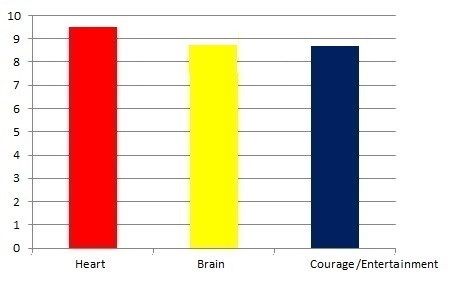 Dear David 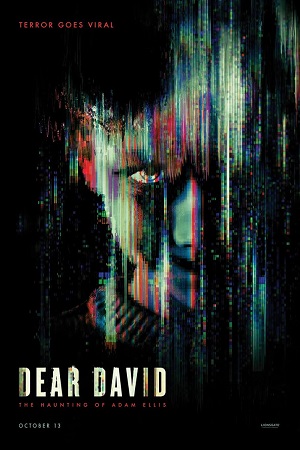 Adam (Augustus Prew) works for BuzzFeed, has a boyfriend, Kyle (René Escobar Jr.), struggles to impress his boss, Bryce (Justin Long), at work and lives alone. After he replies "GDIF" (Go Die in a Fire) to what he assumes is an online troll, he experiences sleep paralysis and paranormal activity inside his apartment while the ghost of a young boy named David haunts him. Anyone who interacts with David online can only ask him two questions; any more questions will lead to their death. Loosely based on a true story, the screenplay by Mike Van Waes has a premise that sounds terrifying like Paranormal Activity, but it barely has enough scares to justify being called a horror film. It also lacks the imagination and suspense to be an engaging sci-fi thriller because it gives way too much key information early on, so the audience knows more than Adam by the time you're introduced to him. There are no surprises, clever twists or anything to elevate the film beyond mediocrity during the first 45 minutes. Around the half-way mark, Dear David begins losing steam and takes a sharp nosedive as it becomes repetitive and sorely lacking in narrative momentum. The performances are decent at best and there are no bad laughs. Augustus Prew doesn't have much charisma, though, nor does he help to make Adam stand out as the protagonist, but the vapid and bland screenplay doesn't help much either. Moreover, Justin Long is wasted in a boring role as Adam's boss at BuzzFeed. There's nothing exceptional about the CGI effects, the lighting, set design or editing although there are a few creepy moments, but they're ephemeral. At a running time of 1 hour and 35 minutes, Dear David, just as undercooked, lazy and disappointing as Exorcist: The Believer which, similarly, doesn't take any risks and leaves the audience underwhelmed and hungry for more palpable horror and suspense.
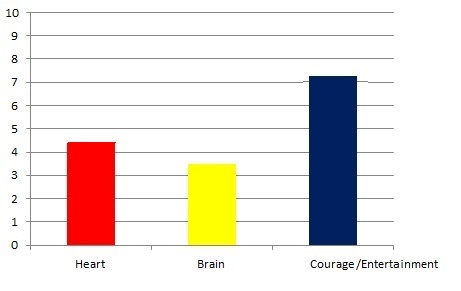 Divinity 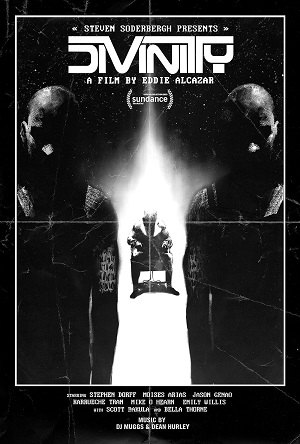 In the distant future, Jaxxon (Stephen Dorff) has successfully created a formula called Divinity that can make people immortal. Two brothers (Moises Arias and Jason Genao) hold him hostage and demand that he stop producing Divinity. There have been a number of sci-fi thrillers throughout the years that have gone bonkers. Some, like Brazil. Poor Things, A Clockwork Orange and the underrated The American Astronaut are brilliant and wildly entertaining. Unfortunately, Divinity doesn't even hold a candle to those superior sci-fi mindfucks. The screenplay by writer/director Eddie Alcazar does a subpar job of introducing the characters and incorporating exposition. There's nothing wrong with confusing the audience as long as they're still engaged on some level. Alcazar deserves credit for an intriguing, inspired premise and taking risks. However' the film's systemic issue is that it doesn't make any of its ideas anywhere exciting as the plot becomes more and more convoluted. There are some shades of Alexandro Jodorowsky and Terry Gilliam, but without the fun, brilliance and exhilarating thrills. Perhaps if Divinity were campy and didn't take itself too seriously, it would've been a guilty pleasure albeit a mindless one too. Is it too much to ask for a modicum of wit or comic relief? On a purely aesthetic level, Divinity is a visual feast. The black-and-white cinematography looks dazzling with special effects that are, at times, reminiscent of Ray Harryhausen's visual effects. Even when the plot becomes lethargic and less and less engaging, there's always the cinematography, set design and make-up design to keep your eyes glued onto the screen. The music score, though, is quite overbearing and irritating. Bella Thorne has a supporting role as Ziva, a mysterious woman who leads other women in the desert, but, like most of the other characters, she remains a mystery with no backstory. The only character with somewhat of a backstory is Jaxxson whose father, Sterling (Scott Bakula) built the Divinity empire. At a running time of 1 hour and 28 minutes, Divinity is bold, bonkers and visually stylish, but dull, exhausting and increasingly anemic. 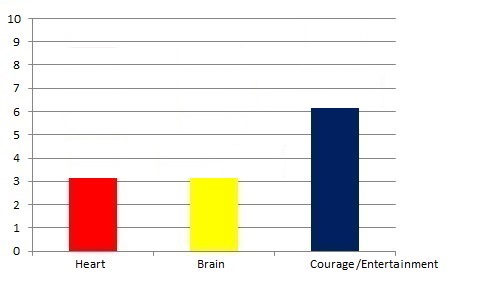 The Elderly  After his wife commits suicide, Manuel (Zorion Eguileor) goes on a downhill spiral emotionally while suffering from dementia. He and other senior citizens soon begin to behave more and more bizarrely which cause his son, Mario (Gustavo Salmeron) and granddaughter, Naia (Paula Gallego), to worry. The screenplay by writer/co-director Raúl Cerezo and his co-writers, Javier Trigales and Rubén Sánchez Trigos, begins as understated, psychological horror thriller and provocative allegory that gradually builds suspense before becoming heavy-handed and repetitive. It's most captivating during the creepy and foreboding first half before it morphs into a supernatural thriller with shades of Darren Aronofsky's mother!, although not quite as bold. A truly great film, according to Francois Truffaut, has a perfect blend of Truth and Spectacle. The Elderly focuses too much on the Spectacle without exploring the Spectacle within the Truth enough. For example, Manuel's wife commits suicide during the first 5 minutes, but the film doesn't bother to develop Manuel's relationship with her up until that point. Was she depressed? Was their marriage on the rocks? What was going on inside of her before she took her own life? Unfortunately, the screenwriters don't do an effective enough job of getting to know these senior citizens who seem more like a plot device to generate scares during the second half. Meanwhile, there's a heatwave with temperatures continuing to rise as the film gets increasingly intense. Without much in terms of comic relief or some kind of levity, the intensity and grimness feels overwhelming and even a little exhausting as well as monotonous. Moreover, its allegory about the dehumanization of the elderly and the fear of death is presented in a way that's shallow, obvious and redundant. The filmmakers deserve to be commended, though, for the unconventionally dark un-Hollywood ending that's almost as bold as the ending of The Mist. The performances are excellent all across the board with no one giving a weak or hammy performance. The film's major strength is its cinematography, use of lighting and set design which creates a palpably eerie and gritty atmosphere, so its style occasionally becomes part of its substance. There are also a few scary moments and impressive make-up design/special effects, although this isn't the film doesn't rely too heavily on visual effects until the third act. There are pacing issues, though. The first half has a slower pace, but the second half picks up the pace before the last few minutes which feel a bit rushed. If only the film could've maintained its slow-burning pace and trusted the audience's patience and imagination more. At a running time of only 1 hour and 35 minutes, The Elderly is a relentlessly dark and grim allegory that's initially provocative with a foreboding, creepy atmosphere and psychological terror before morphing into a shallow, repetitive, unevenly paced and heavy-handed horror thriller. 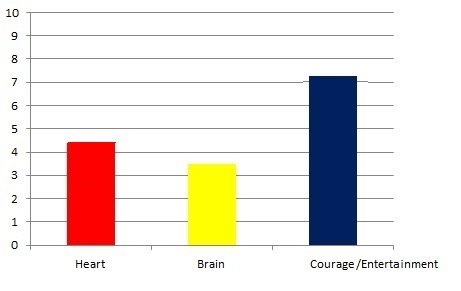 In the Fire 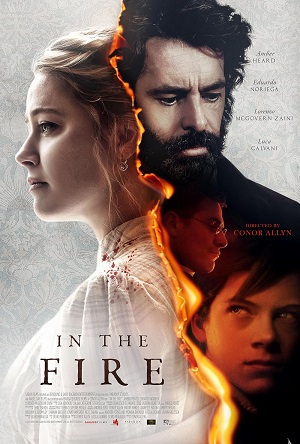 In the late 19th century, Grace (Amber Heard), a psychiatrist, travels from New York to a plantation in Spain to investigate the strange behavior of a young boy, Martin (Lorenzo McGovern Zaini), who may or may not be possessed by the devil. Another week, another B-movie about demonic possession. The screenplay by writer/director Conor Allyn and his co-writers, Pascal Borno and Silvio Muraglia, suffers from clunkiness, stilted dialogue, lazy exposition and a lackluster plot that's dark, but very low on suspense and intrigue. The film doesn't waste any time by cutting right to the meat of the story within the first ten minutes as Grace arrives at the plantation where she meets the young boy, Martin, Martin's father, Nicholas (Eduardo Noriega), Father Gavira (Yari Gugliucci) and Father Antonio (Luca Calvani). She claims that there's a natural explanation for Martin's behavior. Her disbelief in the supernatural clashes with the party line of the priests who believe that Martin is possessed by the devil. Those, on paper, sound like they could lead to some palpable tension and suspense, but, in execution, they fall flat. In one of the film's distracting and contrived subplots, Grace gets close to Martin's father and has an affair with him. None of the relationships throughout the film feel even remotely organic, even the bond between Grace and Martin which doesn't even come close to being heartfelt. In the Fire does go into dark territory, though, in the third act and isn't afraid to escalate the grittiness and intensity. It's too bad that it runs out of steam early and turns into a shallow, tedious and forgettable horror thriller. Unfortunately, Amber Heard is miscast here and gives a hammy performance that's incapable of rising above the emotionally hollow screenplay or breathing much-needed life into her role. The child actor is fine, though, and the same can be said about the other actors who are mediocre at best without managing to enliven the film. The set design, costume design and cinematography are terrific, though, but the visual style doesn't compensate for the lack of substance. That said, the pace moves briskly and the running time clocks only 1 hour and 27 minutes, so at least In the Fire isn't a chore to sit through. 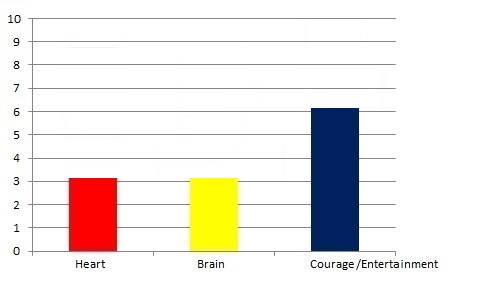 The Road Dance 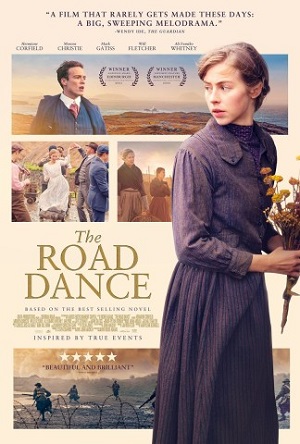 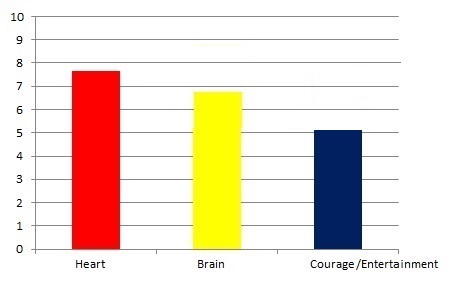 |



